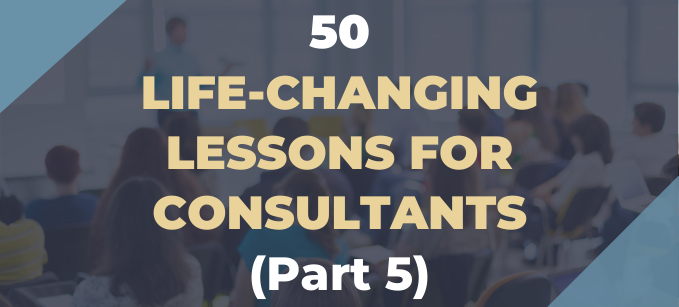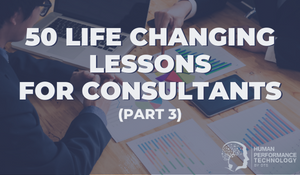50 Life-Changing Lessons for Consultants (Part 5)

Inspired by an article called 45 Valuable Life Lessons For People Of Any Age, we took some time out to reflect on the most valuable business lessons we have collected from 40+ years of experience in the talent management industry. This is part 5 of 5 in the series.
41. Money Upfront.
Every seasoned consultant and trainer we’ve met has one: a horror story about not getting paid. While the risk of a client not paying is actually quite low, the more immediate problem it creates for you is cash flow (without which you are dead in the water), time and hassle spent chasing up payment, and credibility — because it really doesn’t look good if you’re not getting paid up front, and the customer knows it.
Make it your default position to have full payment upfront as part of your terms of business. A rule of thumb for some consultants is if it’s $2,000 or less, charge 100% upfront. If upfront is not possible, getting a deposit is a minimum. Get a 10-50% deposit with a written agreement to have full payment by X date. Asking for 50% is very common.
You may wish to offer a discount (5-10%) or some other form of incentive for early payment.
For recurring payments or monthly retainers, you may wish to implement a credit card authorisation form at the start of the relationship that gives you permission to charge an allocated card at a particular time/instance.
There are some situations, particularly with large corporations, where upfront payment can be very difficult. The problem is not that payment is difficult, but it is a problem when your default position is to not care how you are paid. Many consultants simply don’t insist on upfront from the beginning. Why? Maybe due to habit, maybe due to lack of self-confidence, maybe there is no reason to suspect the client won’t pay, maybe they want to appear flexible to the client, or maybe because they simply don’t realise that is it OKAY to insist on payment upfront.
Not only is it OKAY and entirely common practice — it’s unprofessional not to.
The least professional thing you can do as someone who sells business advice for a living is appear to devalue your own services by effectively working for free when you would never give that same kind of advice to one of your clients. It’s okay if the client says no, but it’s not okay not to ask.
42. What’s their Budget?
If asked for your rate, FIRST find out the client budget and scope of the project before answering.
43. What’s Your Value?
There is a universal sales truth: To a prospect, any price is too high until he or she understands the value of your product or service. If you prematurely quote price without any context around the value you bring and what ROI you can deliver, the price becomes the focal point, when the conversation should be about value.
44. “My fee is X, but I want to work within your budget.”
(This point applies if the client says they’re still working out the budget). The phrase “I want to work within your budget” is something we picked up from Eve Peal (an Emmy-winning make-up artist). She believes the biggest mistake young make-up artists make when asked about their rate is to reply, “My rate is X,” with no other information. You never want to cut off the negotiation and leave the customer with the impression that they should just move on if you’re not a perfect financial match. Ideally, you want to set you price a little higher than the market and then be willing to come down a little so the client feels like they’re getting a great deal.
45. Provide Comparisons.
When talking price, it often helps to provide a comparison of what similar consultants would be paid. (e.g., “What I’ve quoted you is in line the standard rate for a quality consultant in this field.”)
46. Provide Packed Prices (Do Not Itemise).
If your products and services are clearly separated, a good HR manager will cherry pick out the costs perceived to be unnecessary. (e.g., “We don’t need workbooks.”) If your service offering looks like a list of menu options, they are going to be lowered. Use one price, everything included.
47. Increase Your Half-Day Rate.
For most trainers, the same amount of preparation, energy and expenses will go into a half-day as a full-day training event. This also means that you won’t be able to schedule multiple client jobs on the same day. Your client needs to understand that if they want you for a half-day, they’re really taking up a full day of your time and so both rates are going to be very similar. Don’t make your half-day rate 50% of your full day rate. Make it 75-100%.
48. Add Value, Don’t Discount.
Let’s say you’ve written a book on leadership. Someone wants to buy 100 copies and asks for a discount. Give them a volume bonus of 10 extra books (valued at $ amount), not a direct $ discount. Remember, if you don’t believe in the value of your product or service, your customers never will.
49. Residual Income / Passive Income.
As a coach/consultant, your ability to make money is capped by the number of hours you are physically able to work during the week. If you stop work, your income stops. This is known as active income. By contrast, passive income is regular income earned as a result of putting in some initial effort up-front, which then requires relatively low levels of ongoing work to maintain. Examples include rent from properties, book royalties, online products, monthly memberships, investment stocks, and (in the case of our business) online assessments. By incorporating assessments into your business service offering, you are not limited by the amount of money you can make. Read More.
50. What’s it costing?
Consider all costs to you and your business (not just the time in front of the client). This means you need to account for your time and expenses to prepare, organise materials, coordinate meetings, travel and more. Ideally, you are able to create a margin whereby your engagements are profitable.
This was the final part of this series. To see part 1, go here.
Topics:
General Business
Theo Winter
Client Services Manager, Writer & Researcher. Theo is one of the youngest professionals in the world to earn an accreditation in TTI Success Insight's suite of psychometric assessments. For more than a decade, he worked with hundreds of HR, L&D and OD professionals and consultants to improve engagement, performance and emotional intelligence of leaders and their teams. He authored the book "40 Must-Know Business Models for People Leaders."



We Would Like to Hear From You (0 Comments)